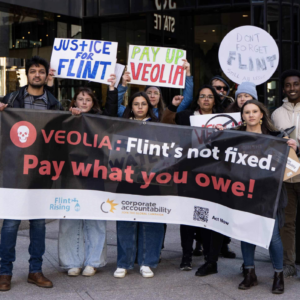Local organizations uplift demands for government, corporate accountability
[Boston, MA/New Orleans, LA/Pittsburgh, PA] – On Thursday, residents in cities across the country called for justice in Flint, as the Michigan city marked a decade since the start of a water contamination crisis that continues to this day.
“After ten years, we should be able to remember the crisis as a past tragedy. Instead, it’s a living nightmare,” said Nayyirah Shariff, executive director of Flint Rising.” Justice delayed is justice denied, but we must still hold the corporations and government officials involved accountable. It’s the only way to put this travesty behind us and prevent it from happening to other communities like ours.”
In 2014, a Michigan state-appointed emergency manager pushed through a cost-cutting measure that resulted in the widespread contamination of the water supply of the majority-Black city. A decade later, Flint still does not have reliable access to safe water; no one has been held accountable; and residents have yet to see a penny of compensation.
While media attention has focused on the role of public officials like former Governor Rick Snyder, allies in Boston, New Orleans, and Pittsburgh drew attention to another key player in the crisis: the world’s largest private water corporation, Veolia.
After being hired in early 2015 to assess Flint’s drinking water system, Veolia executives told the city its water was safe despite privately acknowledging the potential for lead contamination – all while pursuing a separate contract to privatize the city’s water system.
Boston organizers rallied outside of Veolia’s North American headquarters on Thursday, the same day as the corporation’s annual shareholders’ meeting in Paris, where it reported $45.1 billion in 2023 revenues.
“Veolia executives were clearly more interested in their profits than in the well-being of Flint families,” said Neil Gupta, water campaign director at Corporate Accountability. “Veolia’s track record in Flint and elsewhere should be a warning to any town or city considering doing business with it, or turning their public services over to a corporation, period.”
Case in point is Pittsburgh, where residents rallied on Thursday in solidarity with Flint, having faced a Veolia-related water crisis of their own. Under Veolia’s management, the city’s water authority switched a corrosion control chemical to a cheaper alternative without the required state approval. This decision was followed by a lead contamination crisis across the city. In the end, Veolia walked away with over $11 million from its management contracts in Pittsburgh, while local officials were left to find hundreds of millions of dollars to replace pipes leaching lead.
“Pittsburgh stands in solidarity with the people of Flint at a crucial intersection of environmental and social justice,” said Gabby Gray, Organizer with Pittsburgh United’s Our Water Campaign. “We are deeply rooted in the belief that clean, accessible water is a fundamental human right and we demand restorative justice from Veolia and other bad actors that have compromised the safety and integrity of our water. We demand accountability and real solutions to address the water crises disproportionately affecting marginalized communities across the country.”
The Water Collaborative of Greater New Orleans is set to hold a public education night to uplift Flint’s demands and discuss local water issues. In a familiar pattern of disenfranchisement, the far-right Louisiana governor, Jeff Landry, is maneuvering to take control of the majority-Black city’s struggling water system, and likely privatize it.
“Access to potable water is a human right that we are all born with. Yet from Flint to New Orleans, Jackson to Cape Town, Pittsburgh to Lagos, our water is in danger. The cause is not only the climate crisis, but also systemic mismanagement and disinvestment from communities of color, anti-democratic resource grabs, and corporate capture of what should be public systems. As the regional leader in urban water management in New Orleans, we have to hold our political leaders, water utilities, and government entities accountable for not providing us with clean, safe drinking water,” said Keree Blanks, Green Infrastructure & Engagement Coordinator with The Water Collaborative.
Attendees at the solidarity events were encouraged to flood Veolia’s phone lines and inboxes as well as sign a petition urging Michigan Attorney General Dana Nessel, who campaigned on a platform of environmental justice, to pursue all legal avenues to hold responsible parties accountable for their role in the crisis.
###







